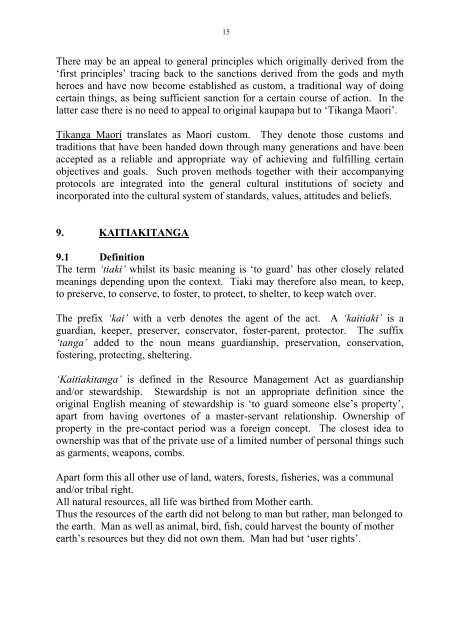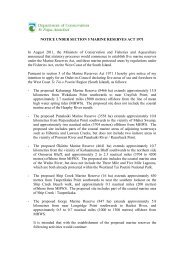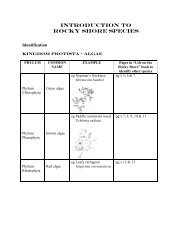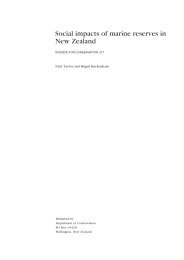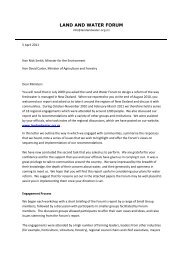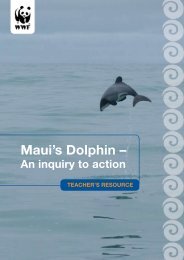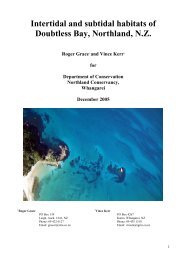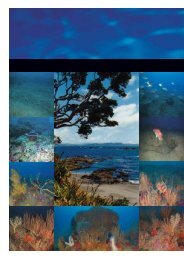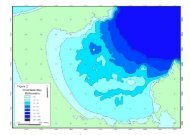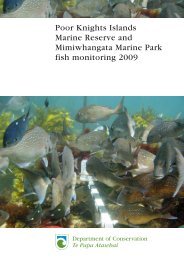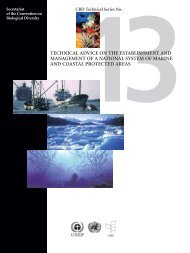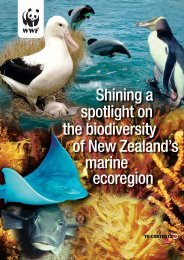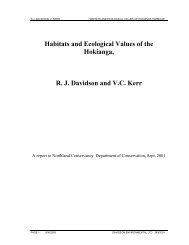KAITIAKITANGA A Definitive Introduction to the ... - MarineNZ.org.nz
KAITIAKITANGA A Definitive Introduction to the ... - MarineNZ.org.nz
KAITIAKITANGA A Definitive Introduction to the ... - MarineNZ.org.nz
You also want an ePaper? Increase the reach of your titles
YUMPU automatically turns print PDFs into web optimized ePapers that Google loves.
15<br />
There may be an appeal <strong>to</strong> general principles which originally derived from <strong>the</strong><br />
‘first principles’ tracing back <strong>to</strong> <strong>the</strong> sanctions derived from <strong>the</strong> gods and myth<br />
heroes and have now become established as cus<strong>to</strong>m, a traditional way of doing<br />
certain things, as being sufficient sanction for a certain course of action. In <strong>the</strong><br />
latter case <strong>the</strong>re is no need <strong>to</strong> appeal <strong>to</strong> original kaupapa but <strong>to</strong> ‘Tikanga Maori’.<br />
Tikanga Maori translates as Maori cus<strong>to</strong>m. They denote those cus<strong>to</strong>ms and<br />
traditions that have been handed down through many generations and have been<br />
accepted as a reliable and appropriate way of achieving and fulfilling certain<br />
objectives and goals. Such proven methods <strong>to</strong>ge<strong>the</strong>r with <strong>the</strong>ir accompanying<br />
pro<strong>to</strong>cols are integrated in<strong>to</strong> <strong>the</strong> general cultural institutions of society and<br />
incorporated in<strong>to</strong> <strong>the</strong> cultural system of standards, values, attitudes and beliefs.<br />
9. <strong>KAITIAKITANGA</strong><br />
9.1 Definition<br />
The term ‘tiaki’ whilst its basic meaning is ‘<strong>to</strong> guard’ has o<strong>the</strong>r closely related<br />
meanings depending upon <strong>the</strong> context. Tiaki may <strong>the</strong>refore also mean, <strong>to</strong> keep,<br />
<strong>to</strong> preserve, <strong>to</strong> conserve, <strong>to</strong> foster, <strong>to</strong> protect, <strong>to</strong> shelter, <strong>to</strong> keep watch over.<br />
The prefix ‘kai’ with a verb denotes <strong>the</strong> agent of <strong>the</strong> act. A ‘kaitiaki’ is a<br />
guardian, keeper, preserver, conserva<strong>to</strong>r, foster-parent, protec<strong>to</strong>r. The suffix<br />
‘tanga’ added <strong>to</strong> <strong>the</strong> noun means guardianship, preservation, conservation,<br />
fostering, protecting, sheltering.<br />
‘Kaitiakitanga’ is defined in <strong>the</strong> Resource Management Act as guardianship<br />
and/or stewardship. Stewardship is not an appropriate definition since <strong>the</strong><br />
original English meaning of stewardship is ‘<strong>to</strong> guard someone else’s property’,<br />
apart from having over<strong>to</strong>nes of a master-servant relationship. Ownership of<br />
property in <strong>the</strong> pre-contact period was a foreign concept. The closest idea <strong>to</strong><br />
ownership was that of <strong>the</strong> private use of a limited number of personal things such<br />
as garments, weapons, combs.<br />
Apart form this all o<strong>the</strong>r use of land, waters, forests, fisheries, was a communal<br />
and/or tribal right.<br />
All natural resources, all life was bir<strong>the</strong>d from Mo<strong>the</strong>r earth.<br />
Thus <strong>the</strong> resources of <strong>the</strong> earth did not belong <strong>to</strong> man but ra<strong>the</strong>r, man belonged <strong>to</strong><br />
<strong>the</strong> earth. Man as well as animal, bird, fish, could harvest <strong>the</strong> bounty of mo<strong>the</strong>r<br />
earth’s resources but <strong>the</strong>y did not own <strong>the</strong>m. Man had but ‘user rights’.


